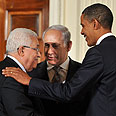
Obama and the Middle East
Half way through his first term, US president lets Middle East slip through fingers. Peace talks break down, Syria-Iran relations tighten, Hezbollah dominanting Lebanon. Bright side: Economic sanctions on Iran working
If there is one area in which Obama was successful it is creating a diligent and sophisticated diplomacy to establish an international coalition, which voted in favor of the sanctions against Iran at the United Nations Security Council. The economic pressure is beginning to take its toll on Iran, even if it has yet to "convince" the Iranian regime to abandon its dream of nuclear capabilities.
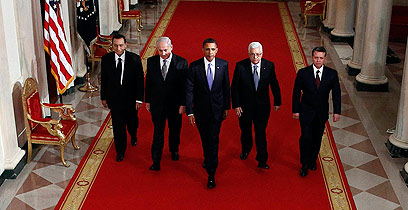
Despite vigorous declarations made by Obama when he first entered the White House, his first two years in Washington were filled with rookie mistakes regarding the Middle East, mistakes that hurt the US' ability to convince the Palestinians to take part in direct negotiations and coerced Israeli Prime Minister Benjamin Netanyahu into showing his cards.
Everyone in Israel is disappointed with Obama: The Right is upset over US pressure to freeze settlement construction, while the Left is frustrated because in its mind Obama failed to put enough pressure on Israel.
Today the Middle East is united in its disappointment in Obama. The Muslims and Arabs in particular were let down by the president, as they expected a new US approach towards Israel following the Cairo and Istanbul speeches. Obama did in fact pressure Israel publicly, but in the past couple of years the relationship between the US and Israel regarding security, intelligence, diplomacy and strategic issues grew much closer.
It's no secret that the public demand made by Obama to halt construction in the West Bank settlements was the main factor which brought Israel to freeze the construction. However this pressure should have been applied behind the scenes, if at all. In that case, Obama might have realized that both Netanyahu and Palestinian President Mahmoud Abbas were not the kind of leaders who can make such a historical decision.
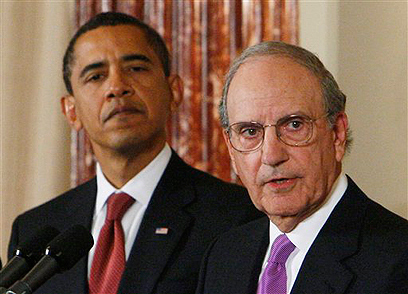
Obama wasted no time, unlike his predecessors Bill Clinton and George W. Bush, and immediately appointed George Mitchell as US special envoy to the Middle East and declared his commitment towards promoting peace.
He had said many times that it is not only in Israel's best interest to reach a two-state solution and preserve its Jewish and democratic identity, but it was also an American strategic interest to achieve Israeli-Arab peace.
From the moment he first stepped into the Oval Office, Obama was forced to deal with the US global war on Islamic terror and handle the given state of American soldiers deployed in two separate Islamic countries, Iraq and Afghanistan, fighting wars.
The American president thought peace between Israel and the Arab world, but especially between Israel and Palestinians, would help him get close to the Muslim world and dissolve its animosity towards the US. He truly believed that promoting peace would also help him when dealing with Iran.
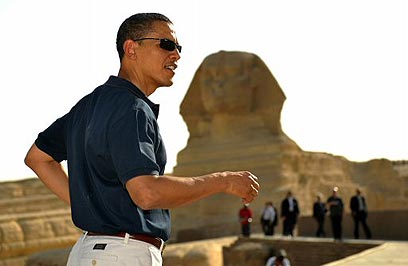
The speeches made by Obama in Egypt and Turkey were his way of letting the Muslim world know that a new dawn has broken. The Americans launched a major diplomatic effort to achieve a breakthrough, but the problems still surfaced.
Everyone in the Middle East tried their best to read between the lines so as to understand what Washington is like under the Obama regime and who is the one making the decisions.
Syrian President Bashar Assad decided to try and make a deal with the US – Syria was to help Washington by calming down the situation in Iraq by blocking any fighters attempting to cross its border into Iraq. In return, the US was to remove all economic sanctions on Damascus.
Senator John Kerry received the green light from Assad to invite General David Petraeus, the head of US central command, to discuss ways to seal the Syrian-Iraqi border. Meanwhile, Washington representatives arrived in Syria to discuss US expectations from Damascus, including cutting all ties with Iran and ceasing its support of Hezbollah and Palestinian terror organizations, particularly Hamas.
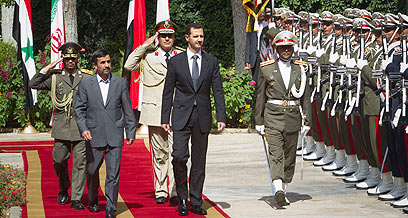
Senior advisor to George Mitchell, Fred Hoff, was then appointed to handle the Syrian issue. He devised a plan to turn parts of the Golan Heights into a national park open to Israelis even after the Jewish state's withdrawal from the disputed region.
The US' mission remains to solve Israel's security issue resulting from a possible withdrawal from the Golan Heights. De-facto, Washington wishes to turn the Golan Heights into a demilitarized zone open to Israeli visitors.
Assad speaks of peace but arms Hezbollah
Many officials in the Israeli defense establishment are in favor of a peace process which will successfully remove Syria from the so-called "axis of evil". Obama's envoys held many meetings with Syrian officials, but after these meetings Assad immediately met with Iranian President Mahmoud Ahmadinejad or with his representatives.
The Americans quickly learned that Assad was insincere. On the one hand he talks of peace, but on the other he continues to arm Hezbollah and signal to Teheran that nothing has changed.
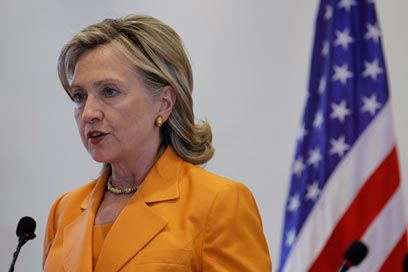
Shortly after General Petraeus' visit to Syria, a booby-trapped car exploded in Baghdad, killing over 100 people. Iraqi Prime Minister Nuri al Maliki then claimed that the explosives were "provided by Syria". This incident occurred only a short while after Obama announced the appointment of a US ambassador to Damascus.
Meanwhile, Israel presented the Americans with proof of a Syrian production line of rockets intended for Hezbollah.
Hillary is fed-up with Syrian games
US Secretary of State Hillary Clinton is fed-up with the Syrian game. In a recent interview she summed up the last couple of years by saying that Syria's behavior does not coincide with Washington's hopes and expectations. She added that the US does not hold talks just to talk, but to actually try and promote its interests.
The US interest is, among others, to establish a sovereign Lebanese state free of foreign influence and to dismantle the country's militias, including Hezbollah.
As of today, Syria is making a comeback and increasing its influence in the area, mainly by massively arming Hezbollah.
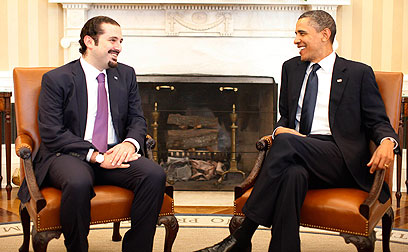
While Obama sat at the Oval Office with Lebanese Prime Minister Saad Hariri, Hezbollah disassembled the Lebanese coalition.
The WikiLeaks website released cables sent to Washington describing what is really going on in Middle East capitals. Saudi Arabia suggested the US set up a Sunni-based force to fight Hezbollah.
'Cut off the head of the snake'
In another cable, the Saudi Arabian king and other Persian Gulf leaders urged Washington to attack Iranian nuclear sites and "cut off the head of the Iranian snake".
The same cables reveal that the Arab world does not see a connection between putting an end to the Iranian threat and solving the Israeli-Arab conflict.
A known historical fact is that all peace processes between Israel and Arabs always began secretly. The Israeli-Egyptian dialogue started with a secret meeting between Moshe Dayan and Hassan Tuhami in Morocco and only later did they ask the US to join as a mediator. The Palestinian agreement was also achieved only after covert talks in Oslo.
Past experience has taught us that only strong Israeli and Arab leaders are capable of advancing a peace process. How will the US react to all the question marks regarding Netanyahu and Abbas' political ability to promote a true peace process? Officials in Washington talk about continued efforts to bring both sides to the negotiations table. However during a public conference in Qatar in January, the US was accused of failing to pressure Israel. Clinton explained that Israel is a sovereign state which makes its own decisions.
Clinton reminded the participants that the US must convince Israel that whatever compromises it makes in preparation for a two-state solution will not jeopardize its future. She added that Israel did withdraw from Lebanon and Gaza but is still constantly attacked by rockets.
Another Intifada?
Washington is debating its next move. Should it enforce a presidential plan? Should it give up and suspend its efforts until both sides beg it to return? The latter decision might make headlines, but the US cannot leave a vacuum which might lead to another intifada, violence and terror.
Even if no solution is visible right now, the US will continue to maintain the conflict by creating an illusion of talks. What will actually happen is that the US will keep a low profile and let nature take its course, without written agreements at this point. Palestinian Prime Minister Salam Fayyad will continue to build Palestinian governmental institutions, and as long as Palestinian security forces grow stronger – Israel will be able to evacuate IDF forces from the West Bank and transfer the area to the control of the Palestinian Authority.
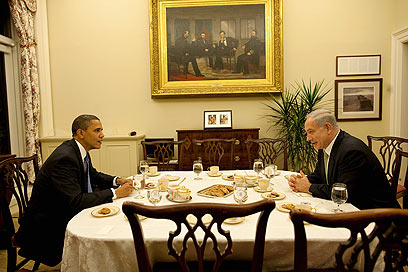
This reality suits Abbas and especially Fayyad, who still lacks the basic political power. This might also be beneficial as far as Netanyahu is concerned, because he knows what he must do but he's not sure he can or wants to make such an important decision.
Abbas and Fayyad believe Israel and the PA have no need for another Camp David, which might lead to more violence on the ground. They prefer to take small measures in order to improve lives and security, which might cause IDF presence in the West Bank to become unnecessary.
Obama's strategy is to make sure any peace agreement will be based on a strong and confident Israel and on regaining Arab honor. Obama has tried to indicate to the Palestinians that mediations are impartial, but in the meantime he continues to strengthen Israel.
During his first couple of years in office Obama appeared as someone who understands Israel's unique situation. He reiterated his commitment to Israeli security and stood by it. No other country in the world is conducting such intense dialogue with Israel like the US.

The Iron Dome (Photo: Defense Minisrty)
Relations between the two countries were expressed not only through talks. Besides the annual $3 billion in defense aid given to Israel, in 2010 Obama decided to allocate an additional $250 million for the Iron Dome project, a mobile air defense system designed to intercept short-range rockets and artillery shells.
A similar amount was allocated for David's Sling, a military system designed to intercept medium to long-range rockets, and the Arrow system against ballistic missiles. This aid has been provided despite the US' dire economic situation, including a deficit of over $14 trillion.
Under Obama's regime Israel and the US army held a joint security drill called Juniper Cobra, with the participation of over 1,300 US soldiers from the Navy, Air Force and Marines.
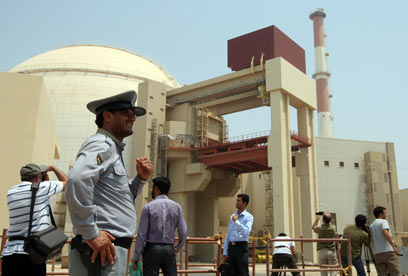
Israeli-US cooperation was also visible on the diplomatic front in attempts to prevent Israeli isolation regarding the nuclear issue and human rights.
Slow moving diplomacy
Obama's strategic diplomacy against Iran succeeded beyond expectations. By taking slow moving diplomatic steps the US managed to expose Iran's true intentions and establish a broad coalition which imposes significant sanctions on Iran via the UN Security Council.
More sanctions were separately imposed on Iran by the US, the European Union, Japan, Canada, Australia and South Korea.
Obama's most significant move in this regard was initiating relations with Russia. The US shut down its defense missile battery in Eastern Europe, a program helmed by former President Bush. In return, Russia decided to call off its sale of long range surface-to-air missile systems (S-300) to Iran.
International pressure mounted, exacting a heavy price from Iran.
The situation on the Iranian front has caused Washington to feel euphoric. The pressure has dropped.
US officials now predict, just like outgoing Mossad Chief Meir Dagan, that the Iranian nuclear threat will not resurface until 2015. Many believe this threat is now no longer on the short list of US priorities. However this issue should still be concerning, not because of what we do know but because of what we do not know.
- Follow Ynetnews on Facebook










